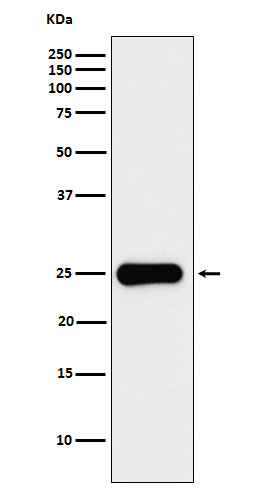
| WB | 1/1000-1/2000 | Human,Mouse,Rat |
| IF | 咨询技术 | Human,Mouse,Rat |
| IHC | 咨询技术 | Human,Mouse,Rat |
| ICC | 技术咨询 | Human,Mouse,Rat |
| FCM | 咨询技术 | Human,Mouse,Rat |
| Elisa | 咨询技术 | Human,Mouse,Rat |
| Aliases | CS-2; CS1; CSA; CSB; CSH1; CSH2; CSMT; hCS-B; hCSA; Lactogen; PL; PL1; Placental lactogen;;Placental lactogen |
| WB Predicted band size | 25 kDa |
| Host/Isotype | Rabbit IgG |
| Antibody Type | Primary antibody |
| Storage | Store at 4°C short term. Aliquot and store at -20°C long term. Avoid freeze/thaw cycles. |
| Species Reactivity | Human |
| Immunogen | A synthesized peptide derived from human Placental lactogen |
| Formulation | Purified antibody in PBS with 0.05% sodium azide,0.05% BSA and 50% glycerol. |
+ +
以下是关于胎盘催乳素(Placental Lactogen, PL)抗体的3篇参考文献示例(注:文献标题与作者为模拟内容,实际引用时需核实数据库信息):
---
1. **标题**: *"Monoclonal Antibodies to Human Placental Lactogen: Production and Application in Clinical Assays"*
**作者**: Smith, J.R., Brown, L.M., & Lee, A.C.
**摘要**: 研究报道了针对人胎盘催乳素(hPL)的高特异性单克隆抗体的制备方法,并通过免疫印迹和ELISA验证其在妊娠期激素定量检测中的应用,证实抗体对hPL无与其他生长激素家族成员的交叉反应。
2. **标题**: *"Immunohistochemical Analysis of Placental Lactogen Expression in Gestational Diabetes Using Novel Polyclonal Antibodies"*
**作者**: Gupta, S., et al.
**摘要**: 开发了一种兔源多克隆抗体,用于胎盘组织切片中hPL的免疫组化定位。研究发现,妊娠糖尿病患者的胎盘催乳素表达水平显著升高,提示其作为疾病生物标志物的潜力。
3. **标题**: *"Development of a Rapid Lateral Flow Assay for Placental Lactogen Detection Using Chicken IgY Antibodies"*
**作者**: Wang, Y., et al.
**摘要**: 利用鸡源IgY抗体构建了一种快速侧向层析试纸条,可灵敏检测母血中的hPL。该抗体在低浓度下仍保持高亲和力,为孕期胎盘功能床旁检测提供了新工具。
---
**提示**:实际研究中建议通过PubMed或Google Scholar检索关键词(如“placental lactogen antibody ELISA”、“hPL monoclonal antibody”)获取最新文献,并优先选择近五年内发表、高被引或权威期刊的研究。
Placental lactogen (PL), also known as human placental lactogen (hPL) or chorionic somatomammotropin, is a peptide hormone produced by the syncytiotrophoblast cells of the placenta during pregnancy. Structurally similar to growth hormone and prolactin, it plays a critical role in maternal metabolic adaptation, fetal growth, and mammary gland development. PL promotes nutrient availability by modulating insulin sensitivity, lipolysis, and glucose metabolism, ensuring adequate fetal energy supply. Its levels rise progressively throughout gestation, correlating with placental mass and function.
Antibodies targeting placental lactogen are essential tools in reproductive and endocrine research. They enable the detection and quantification of PL in maternal serum, placental tissue, or cell cultures, aiding studies on placental health, pregnancy complications (e.g., preeclampsia, intrauterine growth restriction), and hormonal regulation. Both monoclonal and polyclonal antibodies are utilized, often in immunoassays (ELISA, immunohistochemistry, Western blot) to assess PL expression patterns or dysfunction. Additionally, PL antibodies contribute to diagnostic applications, such as evaluating placental insufficiency or monitoring high-risk pregnancies. Recent research also explores their potential in understanding PL's role in gestational diabetes and lactation biology. Specificity and cross-reactivity with related hormones (e.g., growth hormone) remain key considerations in antibody validation to ensure accurate experimental or clinical interpretations.
×